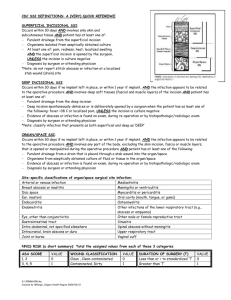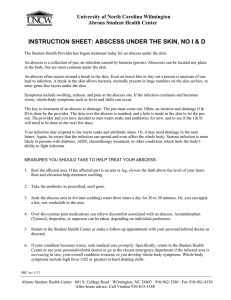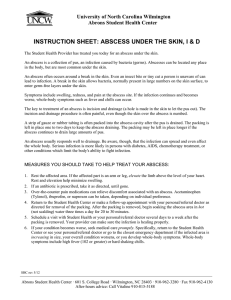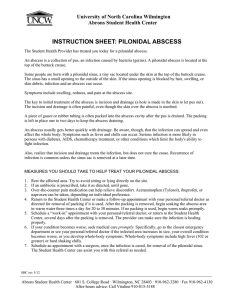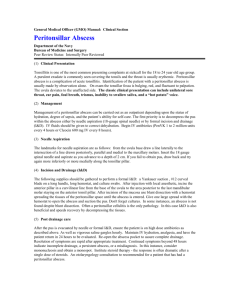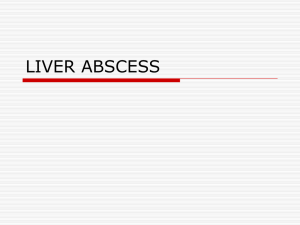Informed Consent – Incision and Drainage of
advertisement
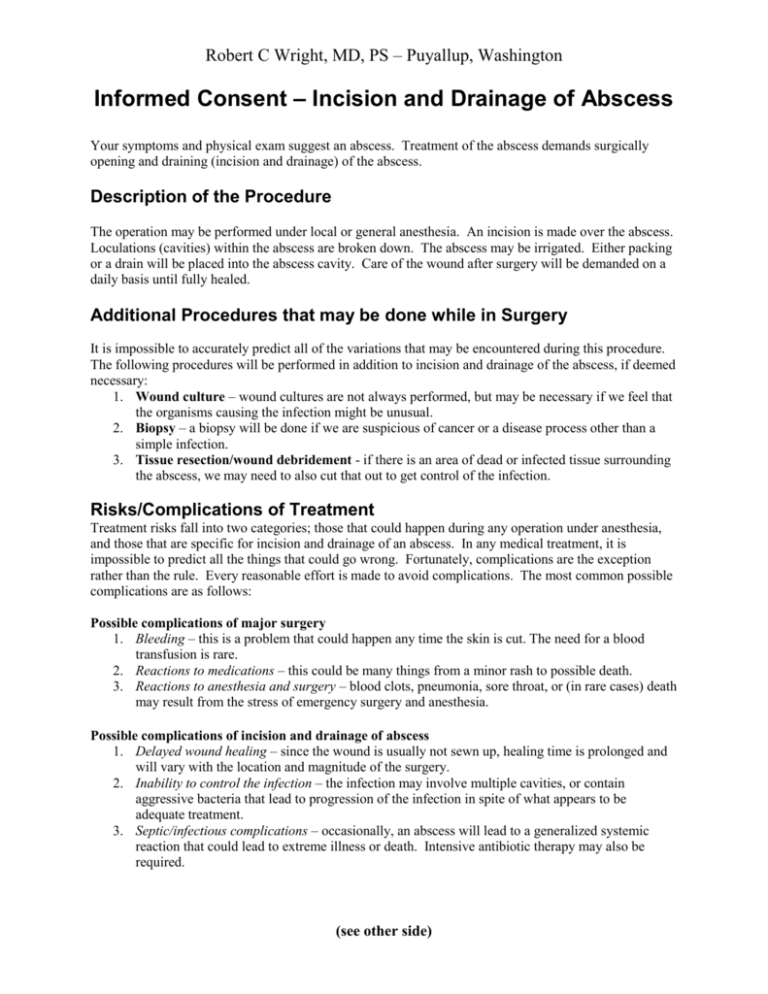
Robert C Wright, MD, PS – Puyallup, Washington Informed Consent – Incision and Drainage of Abscess Your symptoms and physical exam suggest an abscess. Treatment of the abscess demands surgically opening and draining (incision and drainage) of the abscess. Description of the Procedure The operation may be performed under local or general anesthesia. An incision is made over the abscess. Loculations (cavities) within the abscess are broken down. The abscess may be irrigated. Either packing or a drain will be placed into the abscess cavity. Care of the wound after surgery will be demanded on a daily basis until fully healed. Additional Procedures that may be done while in Surgery It is impossible to accurately predict all of the variations that may be encountered during this procedure. The following procedures will be performed in addition to incision and drainage of the abscess, if deemed necessary: 1. Wound culture – wound cultures are not always performed, but may be necessary if we feel that the organisms causing the infection might be unusual. 2. Biopsy – a biopsy will be done if we are suspicious of cancer or a disease process other than a simple infection. 3. Tissue resection/wound debridement - if there is an area of dead or infected tissue surrounding the abscess, we may need to also cut that out to get control of the infection. Risks/Complications of Treatment Treatment risks fall into two categories; those that could happen during any operation under anesthesia, and those that are specific for incision and drainage of an abscess. In any medical treatment, it is impossible to predict all the things that could go wrong. Fortunately, complications are the exception rather than the rule. Every reasonable effort is made to avoid complications. The most common possible complications are as follows: Possible complications of major surgery 1. Bleeding – this is a problem that could happen any time the skin is cut. The need for a blood transfusion is rare. 2. Reactions to medications – this could be many things from a minor rash to possible death. 3. Reactions to anesthesia and surgery – blood clots, pneumonia, sore throat, or (in rare cases) death may result from the stress of emergency surgery and anesthesia. Possible complications of incision and drainage of abscess 1. Delayed wound healing – since the wound is usually not sewn up, healing time is prolonged and will vary with the location and magnitude of the surgery. 2. Inability to control the infection – the infection may involve multiple cavities, or contain aggressive bacteria that lead to progression of the infection in spite of what appears to be adequate treatment. 3. Septic/infectious complications – occasionally, an abscess will lead to a generalized systemic reaction that could lead to extreme illness or death. Intensive antibiotic therapy may also be required. (see other side) Anticipated Recovery/Expected Rehabilitation Recovery is quite variable, depending on the individual and the size and severity of the infection. Under many circumstances, you will be able to return to work the next day. It may take several weeks or more for the wound to heal in. Dressing changes and daily wound care will be required. Consent for Treatment I understand my condition to be an abscess and am aware of its risks if untreated. I have read and understand the above explanation of the procedure being proposed. My surgeon has answered my questions, and I choose to proceed with surgery. I understand that every operation may yield unexpected findings. I give the surgeon permission to act on his best judgment in deciding to remove or biopsy tissues that appear to be diseased, understanding that complications may arise from that action. I understand that while most people with an abscess benefit from the proposed operation, I may not. My condition may not improve, and it may worsen. No absolute guarantee can be made. HIPPA: Before and after surgery, unless otherwise requested in writing by you, visitors whom you invite to attend the surgery will be informed of the surgical findings, your surgical status, and anticipated recovery issues. Because of the anesthetic, you may or may not remember these important details. PRINT NAME__________________________________________________________________________ SIGNATURE ______________________________________________ DATE _________________ WITNESS ________________________________________________ DATE _________________ SURGEON ________________________________________________ DATE _________________ RELATIONSHIP TO PATIENT IF SIGNATURE OF LEGAL GUARDIAN ________________________________ I waive the right to read this form, and do not want to be educated and informed of treatment risks; nonetheless I understand the need for this surgery and grant permission to the surgeon to proceed on my behalf. SIGNATURE _____________________________________________________ DATE ______________ 04/04-consent22.pm5
